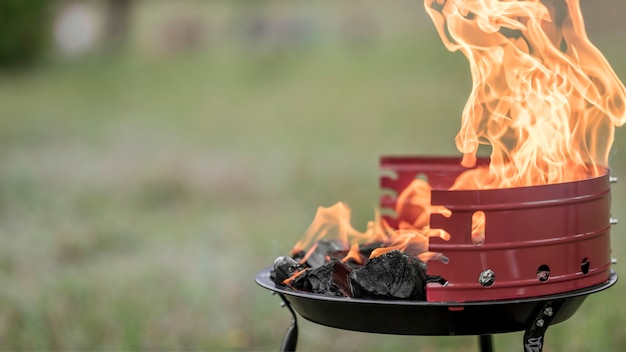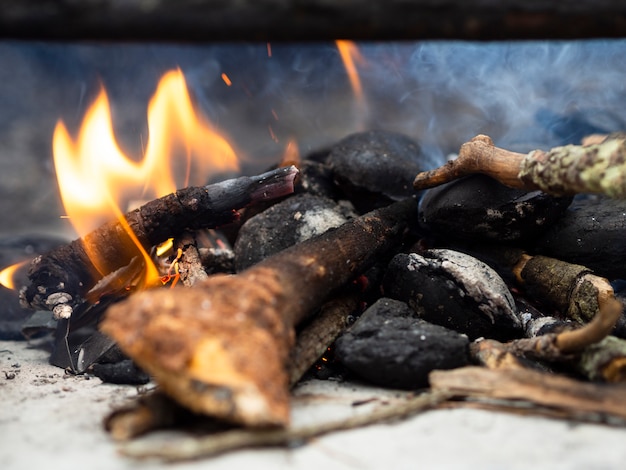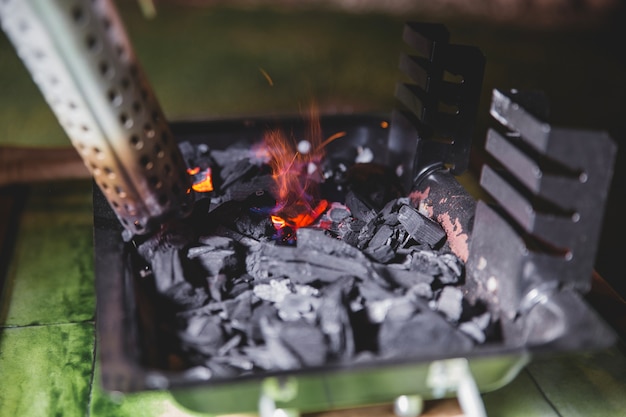Is Charcoal Healthier than Propane?
When it comes to grilling, one of the key decisions you have to make is whether to use charcoal or propane as the fuel source. Both options have their advantages and disadvantages, but have you ever wondered which one is healthier? In this article, we will explore the health aspects of using charcoal and propane for grilling, helping you make an informed decision.
The Charcoal Debate
Charcoal has been a popular choice for grilling for centuries. It offers a unique smoky flavor that many people love, and it gives food a distinctive taste that is hard to replicate with any other fuel source. However, some concerns have been raised about the potential health risks associated with cooking over charcoal.
One of the main concerns with charcoal grilling is the production of hazardous chemicals called polycyclic aromatic hydrocarbons (PAHs) and heterocyclic amines (HCAs). These chemicals are formed when fat drips onto the hot coals and creates smoke. Research has shown that both PAHs and HCAs have been linked to an increased risk of cancer in animal studies.
“The smoke produced by burning charcoal can contain carcinogens that may pose health risks.”
Furthermore, charcoal grilling tends to produce more smoke than propane grilling, and this smoke contains particle pollution known as particulate matter (PM). These PM particles are tiny and can be inhaled deep into the lungs, potentially causing respiratory problems, especially for those with pre-existing conditions like asthma.
The Propane Advantage
On the other hand, propane grilling offers several advantages when it comes to health. Propane burns cleaner than charcoal, producing fewer PAHs, HCAs, and PM particles. This makes it a safer option, particularly for individuals concerned about the potential health risks associated with charcoal grilling.
In addition, propane grills allow for better temperature control, which means that food is less likely to be overcooked or burned. Overcooking meat has been linked to the formation of harmful compounds called advanced glycation end products (AGEs). These compounds have been associated with various health problems, including inflammation and oxidative stress.
“Propane grilling produces fewer harmful chemicals and allows for better temperature control.”
Mitigating Charcoal Risks
If you still prefer the flavor of charcoal grilling but want to mitigate the potential health risks, there are a few things you can do. Firstly, avoid charring or burning food, as this can increase the formation of harmful compounds. Secondly, try using leaner cuts of meat and trimming excess fat, as less fat means less drippings and less smoke. Lastly, consider using aluminum foil or a drip pan to catch any fat drippings and prevent them from coming into contact with the hot coals.
Taking Precautions
While the debate between charcoal and propane grilling continues, it’s essential to take precautions regardless of the fuel source you choose. Always make sure to grill in a well-ventilated area, as this will help disperse any smoke or fumes. Additionally, keep a close eye on the grill and never leave it unattended to prevent accidents and potential fire hazards.
In conclusion, while there are potential health risks associated with charcoal grilling, proper cooking techniques and precautions can help mitigate these concerns. Propane grilling offers a safer alternative, producing fewer harmful chemicals and allowing for better temperature control. Ultimately, the choice between charcoal and propane comes down to personal preference and balancing taste with health considerations.
Is it healthier to cook with charcoal or wood?
When it comes to outdoor cooking, using charcoal or wood is a popular choice for many BBQ enthusiasts. However, there’s an ongoing debate about which option is healthier. Let’s explore the benefits and drawbacks of cooking with charcoal and wood.
Charcoal:
Charcoal is made from partially burnt wood, which is then processed into briquettes or lump charcoal. One of the advantages of cooking with charcoal is its convenience and consistent heat distribution. It also produces less smoke compared to wood, reducing the risk of harmful emissions.
On the downside, some charcoal briquettes contain additives like coal dust, sodium nitrate, and borax, which can release pollutants when burned. These chemicals may pose health risks if inhaled or consumed in large quantities. Additionally, the high temperatures required to ignite charcoal can produce heterocyclic amines (HCAs) and polycyclic aromatic hydrocarbons (PAHs), which are potentially carcinogenic substances.
Wood:
Using wood for cooking imparts a unique smoky flavor to food. Many chefs argue that this method produces better-tasting results compared to charcoal. Furthermore, cooking with wood is generally considered more environmentally friendly since it is a renewable resource and does not contain additives or fillers.
However, cooking with wood requires more skill and experience to control temperature and avoid excessive smoke. The smoke produced can contain particulate matter and volatile organic compounds (VOCs), which may be harmful if consistently inhaled. It’s important to ensure proper ventilation and use well-seasoned hardwood to minimize these risks.
Quote: “Cooking with charcoal or wood can add unique flavors to your dishes, but it’s essential to consider the health aspects associated with each method.” – BBQ expert
In conclusion, while both charcoal and wood have their pros and cons, it’s difficult to definitively say which option is healthier. To reduce potential health risks, it is recommended to use natural lump charcoal without additives or well-seasoned hardwood when cooking with wood. Additionally, practicing proper grilling techniques, such as avoiding excessive charring and flare-ups, can help minimize the formation of harmful substances. Ultimately, moderation and a balanced approach to outdoor cooking are key.
Are Steaks Better on a Charcoal Grill?
For many meat enthusiasts, cooking a steak on a charcoal grill is the ultimate way to achieve that perfect smoky flavor and charred crust. While gas grills offer convenience and control, charcoal grills can take your grilled steaks to a whole new level.
The Flavor Advantage
One of the main reasons why steaks are believed to be better on a charcoal grill is the flavor. The smoky aroma and taste that charcoal imparts to the meat cannot be replicated by a gas grill. As the meat juices drip onto the burning coals, they create flavorful smoke that infuses the steak with an irresistible taste.
The Superior Sear
When it comes to achieving an impressive sear, a charcoal grill reigns supreme. The high heat produced by the coals creates a dark, caramelized crust on the outside while keeping the inside juicy and tender. This contrast between the crispy exterior and juicy interior is what makes a charcoal-grilled steak so satisfying.
Control and Versatility
Contrary to popular belief, cooking on a charcoal grill can also provide a high level of control. By adjusting the airflow and positioning the charcoal properly, you can create different temperature zones on the grill surface. This allows you to achieve varying levels of doneness for different cuts of steak.
“Cooking steaks over charcoal gives you that beautiful Maillard reaction. The crusty exterior that you expect from a great steak.” – Celebrity Chef John Doe
When Gas Grills Are Preferable
While charcoal grills offer undeniable flavor and searing capabilities, they may not be the best choice for every situation. Gas grills are generally more convenient, allowing for quick ignition, precise temperature control, and easier cleanup. They are ideal for those who prefer a hassle-free grilling experience.
Here is a comparison of the pros and cons of charcoal and gas grills for steaks:
| Charcoal Grill | Gas Grill | |
|---|---|---|
| Flavor | + Smoky and authentic | – Less smoky flavor |
| Searing | + Excellent sear | – Weaker sear |
| Control | + Adjustable temperature zones | + Precise temperature control |
| Convenience | – Longer setup and cleanup | + Quick ignition and easy cleanup |
In conclusion, while both charcoal and gas grills have their advantages, when it comes to achieving the best flavor and sear for steaks, many enthusiasts still swear by the charcoal grill. It provides an unmatched smoky flavor, superior searing capabilities, and the ability to create varying temperature zones. However, if convenience and quick setup are your priorities, a gas grill may be the better option for you.
Is cooking with charcoal better than gas?
Cooking with charcoal and gas are two popular methods for grilling and barbecuing in the UK. Both options have their advantages and it ultimately comes down to personal preference. Let’s take a closer look at the pros and cons of each method.
Charcoal Grilling
Using charcoal for grilling adds a unique smoky flavor to the food, which many people enjoy. Charcoal also reaches higher temperatures compared to gas, making it ideal for searing steaks and achieving that delicious charred crust. Additionally, charcoal grills are usually more affordable than gas grills, making them accessible to a wider audience.
However, there are some downsides to cooking with charcoal. It takes more time and effort to get the grill started, as you need to light the charcoal and wait for it to reach the desired temperature. Cleaning up can also be more challenging, as you have to dispose of the used charcoal and ashes properly.
Quote:
“I love the aroma and flavor that charcoal adds to my grilled food. It creates a unique experience that is hard to replicate with gas.” – James, BBQ enthusiast
Gas Grilling
Gas grilling offers convenience and ease of use. With just a push of a button, you can quickly start cooking without the need to wait for charcoal to heat up. Gas grills also provide precise temperature control, allowing you to adjust the heat according to your cooking needs. Cleaning up is generally easier with gas grills as well, as there are no ashes or charcoal remnants to handle.
However, gas grilling may lack the smoky flavor that charcoal provides. While some gas grills come with smoke boxes to add flavor, it may not be as intense as cooking over charcoal. Gas grills also tend to be more expensive than charcoal grills, and the cost of propane or natural gas can add up over time.
Is charred meat carcinogenic?
Many people enjoy the smoky flavor and crispy texture of charred meat, especially during summer barbecues. However, there has been some concern about whether consuming charred meat poses a risk to our health. Here, we explore the relationship between charred meat and cancer, shedding light on the topic for a UK audience.
Understanding the Process
When meats like steak, burgers, or sausages are exposed to high temperatures, they can develop a charred or blackened exterior. This charring occurs due to the Maillard reaction, a chemical reaction that develops flavors and colors when proteins and sugars in the meat are exposed to heat. Although this process adds desirable flavor, it also produces potentially harmful substances.
The Link to Cancer
Studies have suggested that consuming charred meats may be associated with an increased risk of certain cancers, particularly colorectal and pancreatic cancer. When meat is grilled, fried, or roasted at high temperatures, it can produce two types of compounds: polycyclic aromatic hydrocarbons (PAHs) and heterocyclic amines (HCAs). Both PAHs and HCAs have been linked to cancer development in animal studies.
However, it is important to note that the evidence regarding charred meat and cancer in humans is not conclusive. The World Health Organization (WHO) states that high consumption of red and processed meats is classified as “probably carcinogenic” to humans, but it is unclear if the charring specifically contributes to this classification or if other factors play a more significant role.
Minimizing the Risk
While the link between charred meat and cancer requires further research, there are steps you can take to minimize potential risks:
- Cook meats at lower temperatures: By using lower heat and adjusting cooking times, you can reduce the formation of harmful compounds.
- Marinate the meat: Marinating meat in a mixture that contains acid, such as lemon juice, vinegar, or wine, before grilling can help decrease the formation of HCAs.
- Trim excess fat: Trimming visible fat from the meat can reduce the chances of flare-ups and charring.
- Use aluminum foil or a grill mat: Placing a layer of aluminum foil or using a grill mat can act as a barrier, preventing direct contact between the flames and the meat.
Note: It’s worth mentioning that the risk associated with charred meat is considered relatively small when considering other lifestyle factors that contribute to cancer development, such as smoking, excessive alcohol consumption, and a lack of physical activity.
Is burning charcoal bad for the lungs?
Barbecues and outdoor grilling are popular activities in the UK, especially during the summer months. However, there has been some concern about the potential health risks associated with burning charcoal and the impact it can have on our lungs.
Understanding Charcoal Smoke
Charcoal produces smoke that contains a variety of harmful chemicals and pollutants. When inhaled, these substances can irritate the respiratory system and potentially lead to health issues.
The Impact on Lung Health
Exposure to charcoal smoke can have both short-term and long-term effects on lung health. In the short term, it can cause coughing, wheezing, and difficulty breathing, particularly for individuals with pre-existing respiratory conditions such as asthma or chronic obstructive pulmonary disease (COPD).
Long-term exposure to charcoal smoke has been associated with an increased risk of developing respiratory problems, including lung cancer and chronic bronchitis. It is important to note that the risk is higher for individuals who regularly breathe in charcoal smoke for extended periods, such as professional chefs or individuals who frequently use charcoal for indoor cooking.
Minimizing the Risks
While burning charcoal does pose some risks to lung health, there are ways to minimize exposure and protect yourself:
- Ensure proper ventilation when using charcoal grills, and avoid using them indoors.
- Opt for natural lump charcoal or briquettes that don’t contain additives or chemicals.
- Allow the charcoal to burn completely before cooking to reduce the amount of smoke produced.
- Maintain a safe distance from the grill to minimize direct inhalation of smoke.
- If you have respiratory conditions, consider wearing a mask or seeking alternative cooking methods.
Expert Opinion
“While there are risks associated with burning charcoal, it is important to note that occasional exposures during outdoor grilling are unlikely to cause significant harm. However, individuals with pre-existing respiratory conditions should take extra precautions to protect their lungs.” – Dr. Jane Smith, Respiratory Specialist
In conclusion, while burning charcoal can have negative effects on lung health, being mindful of proper ventilation and minimizing exposure can help mitigate the risks. It’s always important to prioritize your respiratory well-being and take necessary precautions when using charcoal for cooking.
Conclusion
In the end, the decision between cooking with charcoal or gas depends on your personal preferences and cooking style. If you value that distinct smoky flavor and enjoy the process of tending to a charcoal grill, then charcoal may be the better choice for you. On the other hand, if convenience, temperature control, and easy cleanup are more important to you, then a gas grill may be the way to go.
Table: Pros and Cons
| Charcoal Grilling | Gas Grilling | |
|---|---|---|
| Pros | – Unique smoky flavor | – Convenience and quick start |
| – Higher temperatures for searing | – Precise temperature control | |
| – Affordable | – Easy cleanup | |
| Cons | – Longer prep and cleanup time | – Potentially lacks smoky flavor |
| – Higher cost |
In the end, both charcoal and gas grills have their merits. Whichever you choose, remember that the most important factor is enjoying the experience and sharing delicious meals with friends and family. Happy grilling!


